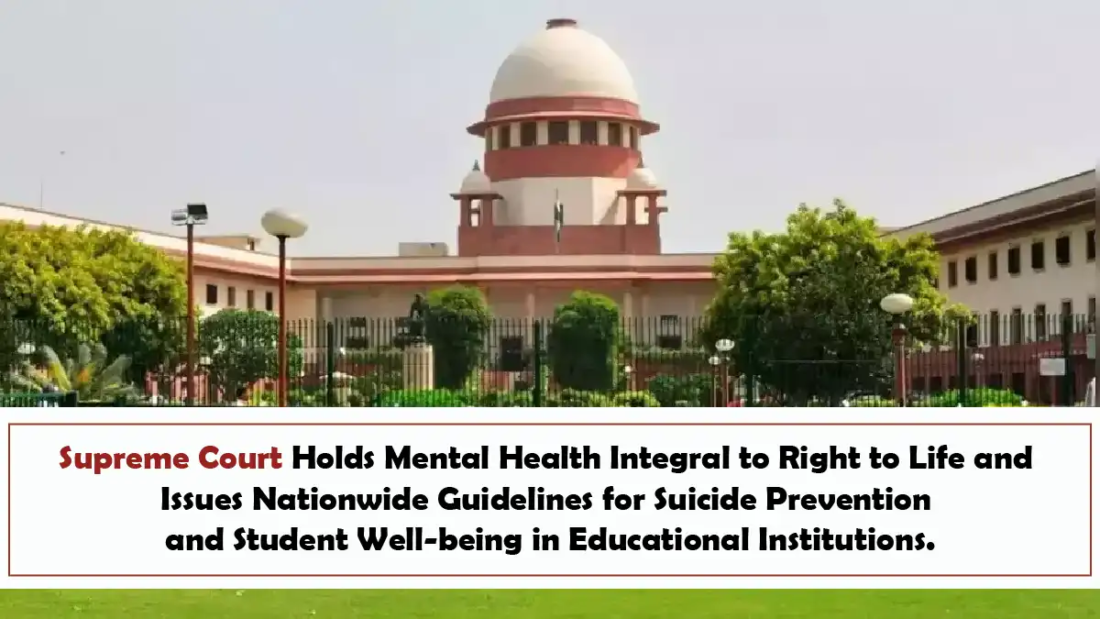Facts of the Case
The appellant, a resident of West Bengal, had enrolled his 17-year-old daughter, Ms. X, at a coaching institute in Vishakhapatnam, Andhra Pradesh, in May 2022, for preparation of the National Eligibility-cum-Entrance Test (NEET). She stayed at Sadhana Ladies Hostel and was also attending Achiever’s Junior College for Class XII.
On the night of 14 July 2023, the appellant received a call informing him that his daughter had fallen from the third floor of the hostel around 10:20 pm and was taken to Venkataramana Hospital with severe injuries. While initially conscious, she reportedly suffered a heart attack the following morning due to the unavailability of specialist care and was placed on ventilator support. The appellant, upon arrival, found his daughter unconscious. Dissatisfied with the treatment, he shifted her to Care Hospital, where she passed away on 16 July 2023. An FIR under Section 174 CrPC was registered, and a postmortem followed.
Suspicious of the circumstances and the lack of proper investigation, the appellant filed a writ petition before the Andhra Pradesh High Court seeking preservation and review of CCTV footage from the hostel and hospitals. An Advocate Commissioner was appointed, and the writ petition was disposed of in February 2024.
In parallel, the appellant lodged another FIR in West Bengal under Sections 302 and 120B IPC against the coaching institute, hostel authorities, and hospital. The Andhra Pradesh Police, upon further inquiry, filed an alteration memo invoking Section 304 of IPC and named four individuals as accused, including the hostel warden and staff from Aakash Institute.
Seeking an impartial investigation, the appellant filed a second writ petition before the High Court, praying for transfer of the probe to the Central Bureau of Investigation (CBI). This petition was dismissed on 14 February 2024, with the High Court observing that, owing to multiple FIRs across states, it lacked jurisdiction to direct a CBI probe. A third writ petition regarding improper forensic classification of the death was also disposed of with directions to send samples to AIIMS, New Delhi. Aggrieved, the appellant approached the Supreme Court via Special Leave Petition.
Contentions of the Petitioner
The petitioner, father of the deceased student, contended that the investigation conducted by the Andhra Pradesh Police was tainted by serious procedural lapses, delay in securing key evidence like CCTV footage, and potential collusion with institutional authorities. He submitted that the conduct of the police in both Andhra Pradesh and West Bengal lacked transparency and credibility, and that the case involved grave violations of the right to life and dignity of his daughter. Given the suspicious circumstances and the involvement of multiple institutions with vested interests, the petitioner prayed for transfer of the investigation to the CBI to ensure impartiality and uncover the truth behind his daughter’s death.
He further submitted that the case highlighted a systemic issue of mental health neglect in competitive coaching environments, and that the tragic death of his daughter should not be viewed in isolation but within the broader context of rising student suicides and institutional apathy.
Contentions of the Respondent
The respondents (State of Andhra Pradesh, institutional authorities, and police) argued that the investigation was being conducted lawfully and that the local police had already taken action, including collection of forensic samples, recording of witness statements, and filing of an alteration memo invoking culpable homicide charges. They emphasized that the Andhra Pradesh High Court had already adjudicated the matter and found no grounds for CBI intervention.
The State also contended that since FIRs were filed in two different states Andhra Pradesh and West Bengal, the transfer of investigation to CBI could only be ordered by the Union Government or upon specific legal grounds, which they argued were absent in this case. They urged the Court to allow the state police to continue with the investigation.
Court’s Observations
The Supreme Court, while deeply acknowledging the individual facts of the case, expanded its analysis to reflect on the broader systemic crisis of student suicides in India, especially in the context of the coaching industry and high-pressure academic environments. The bench, comprising Justices Vikram Nath and Sandeep Mehta, lamented the transformation of education into a high-stakes, performance-driven race that disregards emotional and psychological well-being.
The Court observed that “Mental health is an integral component of the right to life under Article 21 of the Constitution of India… This Court has, in a consistent line of precedents, affirmed that the right to life does not mean mere animal existence, but a life of dignity, autonomy, and well-being.”
Citing Rousseau and Jiddu Krishnamurti, the Court underlined that the goal of education must be holistic development and that contemporary academic structures have become rigid, isolating, and competitive, driving many students to despair. It referred to alarming NCRB data showing over 13,000 student suicides in 2022, with a significant percentage linked to academic stress and exam failures.
The Court reiterated that mental health is an inseparable part of the right to life under Article 21, drawing from precedents such as Shatrughan Chauhan v. Union of India and Navtej Singh Johar v. Union of India. It also referred to the Mental Healthcare Act, 2017 especially Sections 18 and 115 which affirm the right to access mental healthcare and decriminalise suicide attempts. India’s obligations under international law, including Article 12 of the ICESCR and the CRPD, were noted as imposing binding duties to uphold students’ mental well-being.
On the legal front, the Court held that the presence of FIRs in multiple states cannot be used as a shield to deny a fair and credible investigation. It noted substantial lapses in evidence preservation and institutional accountability and found merit in the plea for a CBI investigation.
Recognising the absence of a unified and enforceable legal framework for suicide prevention in educational institutions and coaching centres, the Court issued fifteen binding guidelines to serve as immediate, uniform safeguards across all institutions until formal legislation is enacted:
- Every educational institution, including schools, colleges, and private coaching centres, must adopt and implement a uniform mental health policy aligned with the UMMEED Draft Guidelines, the MANODARPAN initiative, and the National Suicide Prevention Strategy. This policy must be reviewed annually and made accessible on the institution’s website and notice boards.
- Institutions with 100 or more enrolled students must engage at least one qualified counsellor, psychologist, or social worker trained in child and adolescent mental health. Smaller institutions must establish formal referral arrangements with external mental health professionals to ensure students have timely access to support.
- Optimal ratios between students and counsellors must be ensured. Smaller batches of students should be assigned dedicated mentors, particularly during exams and stressful academic transitions, to offer confidential and consistent emotional support.
- Educational institutions and coaching centres must avoid segregating students based on academic performance, publicly shaming them for poor results, or imposing academic targets disproportionate to their capacity. Such practices are linked to psychological harm and institutional abuse.
- Institutions must maintain written protocols for referring students to mental health services, hospitals, and suicide prevention helplines. Contact details for services like Tele-MANAS and other national/state helplines must be prominently displayed in hostels, classrooms, corridors, and websites in clear, legible format.
- Teaching and non-teaching staff must undergo bi-annual training from certified mental health professionals. These sessions should cover psychological first aid, identifying early warning signs, responding to self-harm, and how to sensitively refer students to professionals.
- All staff must be trained to support students from marginalised backgrounds with sensitivity. This includes Scheduled Castes (SC), Scheduled Tribes (ST), Other Backward Classes (OBC), Economically Weaker Sections (EWS), LGBTQ+ students, students with disabilities, those in state or out-of-home care, and those affected by trauma, bereavement, or prior suicide attempts.
- Institutions must establish confidential, accessible grievance redressal systems for incidents of bullying, ragging, caste or gender-based discrimination, sexual assault, and harassment. There must be an empowered internal committee or designated authority to respond promptly and ensure psycho-social support. Failure to act in such cases will be treated as institutional culpability.
- Institutions must organise regular awareness programmes both online and offline for parents and guardians on student mental health. These should educate families on avoiding undue academic pressure, recognising signs of distress, and offering empathetic support.
- Mental health awareness, emotional regulation, life skills education, and information on support systems must be integrated into orientation programmes and co-curricular activities for students.
- Institutions must maintain anonymised records of wellness interventions, student referrals, and training programmes. An annual report on mental health-related activities must be submitted to relevant regulatory authorities such as the State Education Department, UGC, AICTE, or CBSE.
- Institutions must actively encourage sports, arts, and personality development activities. Examination patterns should be periodically reviewed to reduce academic burden and broaden students’ sense of identity beyond test scores.
- Institutions must provide structured, inclusive career counselling to students and parents, delivered by qualified professionals. These sessions should help reduce unrealistic academic pressure and expand awareness of diverse educational and professional options.
- Hostel owners, wardens, and caretakers must ensure campuses are free from bullying, substance abuse, and other harmful influences. Regular inspections and safety measures must be adopted to protect students.
- Residential campuses must install tamper-proof ceiling fans or equivalent safety fixtures. Access to rooftops, balconies, or high-risk areas must be restricted to prevent impulsive acts of self-harm. Special attention must be paid to high-risk coaching hubs such as Kota, Sikar, Hyderabad, Chennai, and others, where institutions must implement elevated standards of care, counselling, regulation, and oversight.
Court’s Order
The Supreme Court set aside the Andhra Pradesh High Court’s judgment and ordered the immediate transfer of the investigation into the death of the appellant’s daughter to the Central Bureau of Investigation (CBI), citing grave lapses by the state police and institutional negligence.
In light of the systemic issues revealed, the Court issued fifteen binding directions applicable across all educational institutions in India schools, colleges, and coaching centres to safeguard students’ mental health. The records submitted to relevant regulatory authority (UGC, CBSE, AICTE) will act as evidence of institutional responsibility and will be subject to audit and monitoring.
The Union of India is directed to file a compliance affidavit within 90 days, outlining steps taken, coordination mechanisms with States and UTs, progress on framing regulations for private coaching centres, and timelines for the National Task Force’s recommendations.
Compliance Mandate for Educational Institutions
As a direct consequence of the judgment, all educational institutions in India including schools, colleges, universities, and private coaching centres, are now legally bound to implement the Court’s mental health safeguards. Institutions must institute comprehensive measures covering record maintenance of counselling sessions, student referrals, teacher and staff training, parental sensitisation initiatives, and infrastructural adjustments designed to enhance safety. Additionally, each institution is required to submit an annual compliance report to the relevant regulatory bodies (such as UGC, AICTE, CBSE, or State Education Boards), which will serve as evidence of adherence and be subject to audit and monitoring.
If you are an educational institution seeking to navigate these new requirements efficiently, our Child Safety at Work (CSAW) and Mental Health at Work (MHAW) verticals are fully equipped to assist educational institutions in implementing these compliance requirements, ensuring that institutions meet the standards set by the Supreme Court and promote student well-being in a structured, regulated environment.
Written by Adv. Deeksha Rai
 Cart is empty
Cart is empty 


